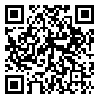BibTeX | RIS | EndNote | Medlars | ProCite | Reference Manager | RefWorks
Send citation to:
URL: http://payavard.tums.ac.ir/article-1-134-en.html
Backgrounds and Aim: Physical activity is one of lifestyle components. 2010 report of health people indicates that physical activity in young people is a high priority of health. A youth attends to maintenance self physical activity till adulthood, since lifestyle is forming mainly in this period. Insufficient physical activity and inactivity with unhealthy nutrition causes chronic diseases such as heart disease, diabetes, ostheoporoses , etc.
Materials and Methods: This study was an interventional educational upon female school students in Tonkabon in 2008 in two groups, intervention and control (each group 300). Data gathering tools included demographic, knowledge/attitude and practice assessment questionnaires. First knowledge ,attitude and practice of whole students was assessed.Then the interventional educational programe: 8 hours education (weekly sessions, every session one hour), lecture, question and answer ,pamphelet, and movies about advantages and disadvantages of physical activity and the nessecity of continuing till the future was done. After two month of intervention ,two groups were compared in knowledge,attitude and practice.The data were analized with SPSS and STATA.
Results: After the intervention, there was a significant increase in mean of knowledge, attitude and practice, in intervention group compared to control group (p<0.05). Educational intervention caused 15 score on knowledge ,5 score on attitude and 1.6 score on practice improvement. Among effective factors variable Such as :mothers literacy and fathers job affected knowledge ,and level of literacy affected attitude , and mothers education affected practice of student.
Discussion and Conclusion: Physical activity is one of the lifestyle components and in young people is a high priority of health. This study shows that Educational intervention caused improvement on knowledge attitude, and practice.
| Rights and permissions | |
 |
This work is licensed under a Creative Commons Attribution-NonCommercial 4.0 International License. |





